Unit: Nursing Code of Ethics and Conduct - Patient Care Outcomes
VerifiedAdded on 2023/01/10
|5
|1143
|32
Essay
AI Summary
This essay examines the nursing code of ethics and conduct, emphasizing the factors that influence a nurse's impact on patient care outcomes. It highlights the importance of nurses' skills, knowledge, understanding of ethical principles, and communication skills. The essay discusses the historical context of the nursing code of ethics, its role in guiding nurses' actions, and its relevance in addressing ethical issues related to health, patients, and organizational dilemmas. It also explores the significance of the code in protecting public health, ensuring competent healthcare, and promoting ethical, legal, and professional behavior among nurses. The essay references various sources to support the importance of ethical codes as creeds and commandments that guide nursing practice and ensure accountability and responsibility. The essay emphasizes the nurse's role in promoting health, alleviating suffering, and preventing illnesses while protecting vulnerable patients.
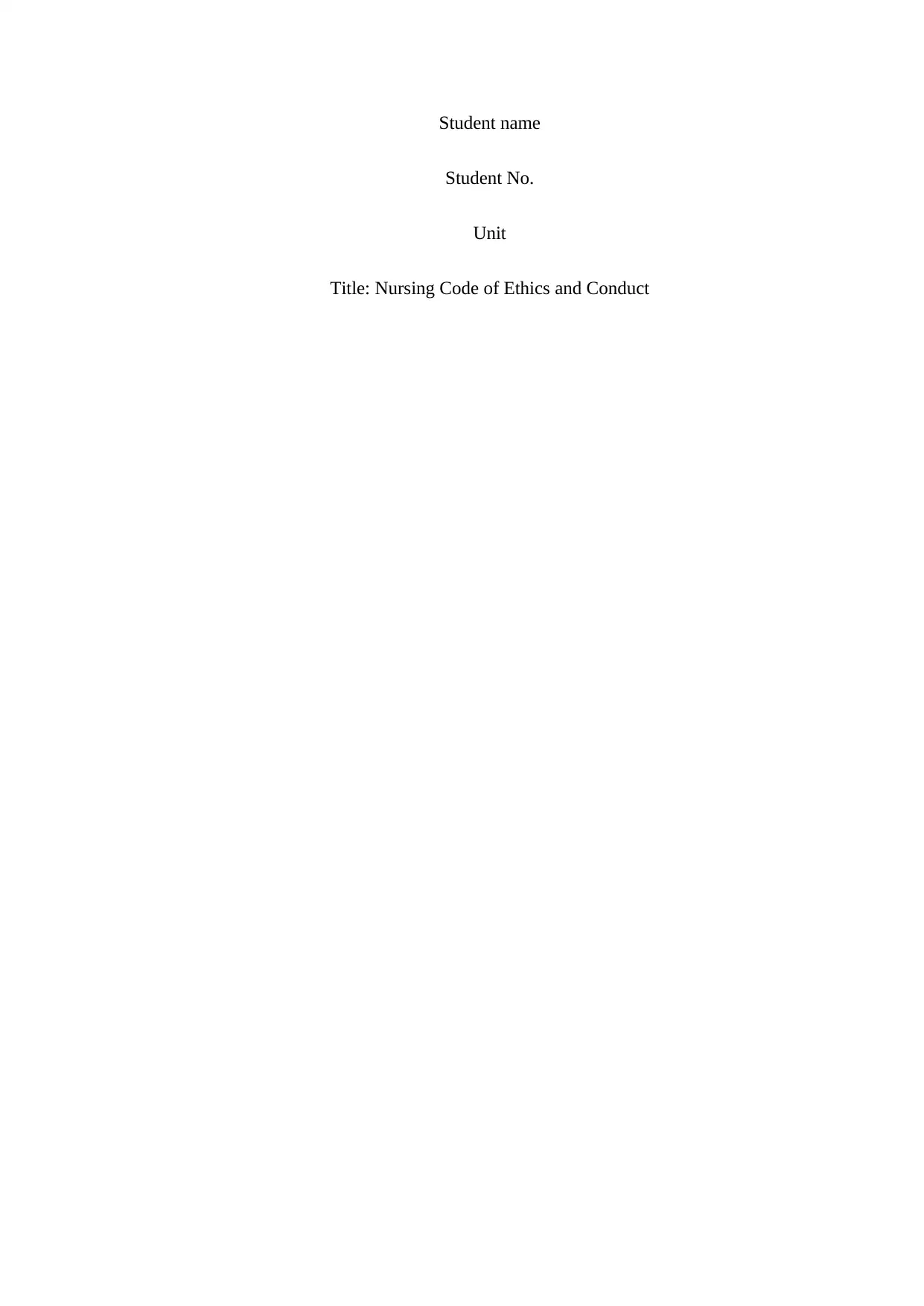
Student name
Student No.
Unit
Title: Nursing Code of Ethics and Conduct
Student No.
Unit
Title: Nursing Code of Ethics and Conduct
Paraphrase This Document
Need a fresh take? Get an instant paraphrase of this document with our AI Paraphraser
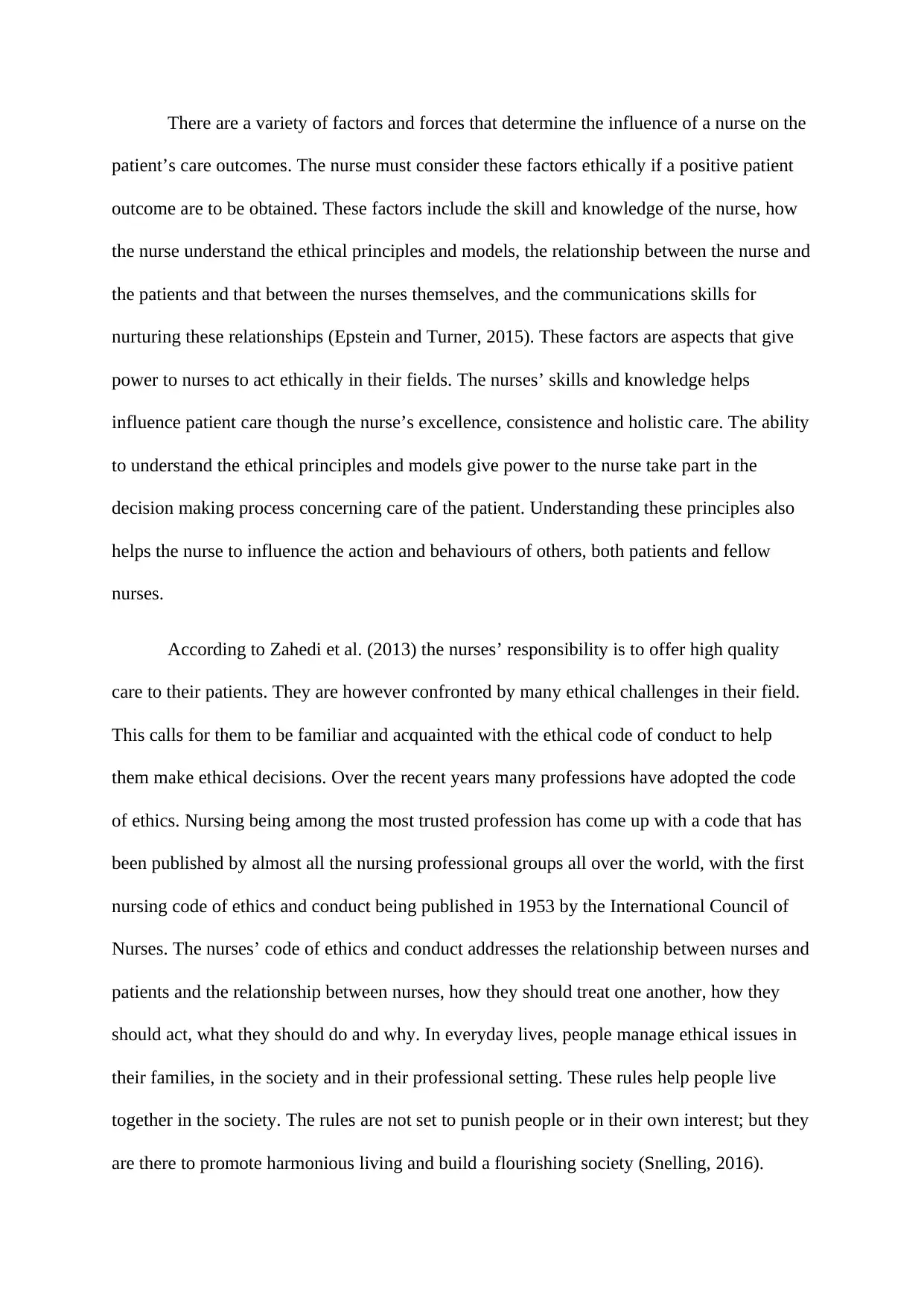
There are a variety of factors and forces that determine the influence of a nurse on the
patient’s care outcomes. The nurse must consider these factors ethically if a positive patient
outcome are to be obtained. These factors include the skill and knowledge of the nurse, how
the nurse understand the ethical principles and models, the relationship between the nurse and
the patients and that between the nurses themselves, and the communications skills for
nurturing these relationships (Epstein and Turner, 2015). These factors are aspects that give
power to nurses to act ethically in their fields. The nurses’ skills and knowledge helps
influence patient care though the nurse’s excellence, consistence and holistic care. The ability
to understand the ethical principles and models give power to the nurse take part in the
decision making process concerning care of the patient. Understanding these principles also
helps the nurse to influence the action and behaviours of others, both patients and fellow
nurses.
According to Zahedi et al. (2013) the nurses’ responsibility is to offer high quality
care to their patients. They are however confronted by many ethical challenges in their field.
This calls for them to be familiar and acquainted with the ethical code of conduct to help
them make ethical decisions. Over the recent years many professions have adopted the code
of ethics. Nursing being among the most trusted profession has come up with a code that has
been published by almost all the nursing professional groups all over the world, with the first
nursing code of ethics and conduct being published in 1953 by the International Council of
Nurses. The nurses’ code of ethics and conduct addresses the relationship between nurses and
patients and the relationship between nurses, how they should treat one another, how they
should act, what they should do and why. In everyday lives, people manage ethical issues in
their families, in the society and in their professional setting. These rules help people live
together in the society. The rules are not set to punish people or in their own interest; but they
are there to promote harmonious living and build a flourishing society (Snelling, 2016).
patient’s care outcomes. The nurse must consider these factors ethically if a positive patient
outcome are to be obtained. These factors include the skill and knowledge of the nurse, how
the nurse understand the ethical principles and models, the relationship between the nurse and
the patients and that between the nurses themselves, and the communications skills for
nurturing these relationships (Epstein and Turner, 2015). These factors are aspects that give
power to nurses to act ethically in their fields. The nurses’ skills and knowledge helps
influence patient care though the nurse’s excellence, consistence and holistic care. The ability
to understand the ethical principles and models give power to the nurse take part in the
decision making process concerning care of the patient. Understanding these principles also
helps the nurse to influence the action and behaviours of others, both patients and fellow
nurses.
According to Zahedi et al. (2013) the nurses’ responsibility is to offer high quality
care to their patients. They are however confronted by many ethical challenges in their field.
This calls for them to be familiar and acquainted with the ethical code of conduct to help
them make ethical decisions. Over the recent years many professions have adopted the code
of ethics. Nursing being among the most trusted profession has come up with a code that has
been published by almost all the nursing professional groups all over the world, with the first
nursing code of ethics and conduct being published in 1953 by the International Council of
Nurses. The nurses’ code of ethics and conduct addresses the relationship between nurses and
patients and the relationship between nurses, how they should treat one another, how they
should act, what they should do and why. In everyday lives, people manage ethical issues in
their families, in the society and in their professional setting. These rules help people live
together in the society. The rules are not set to punish people or in their own interest; but they
are there to promote harmonious living and build a flourishing society (Snelling, 2016).
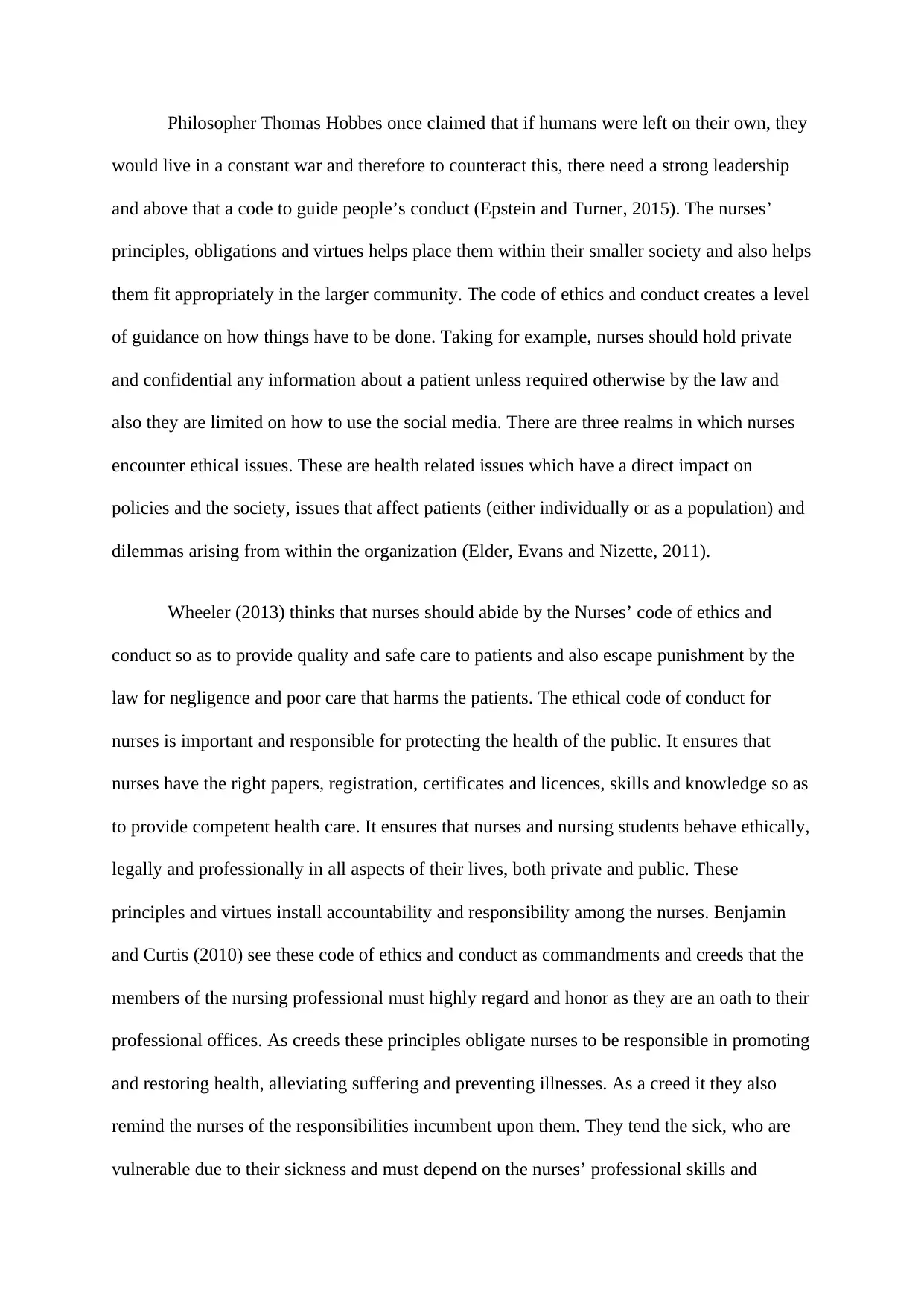
Philosopher Thomas Hobbes once claimed that if humans were left on their own, they
would live in a constant war and therefore to counteract this, there need a strong leadership
and above that a code to guide people’s conduct (Epstein and Turner, 2015). The nurses’
principles, obligations and virtues helps place them within their smaller society and also helps
them fit appropriately in the larger community. The code of ethics and conduct creates a level
of guidance on how things have to be done. Taking for example, nurses should hold private
and confidential any information about a patient unless required otherwise by the law and
also they are limited on how to use the social media. There are three realms in which nurses
encounter ethical issues. These are health related issues which have a direct impact on
policies and the society, issues that affect patients (either individually or as a population) and
dilemmas arising from within the organization (Elder, Evans and Nizette, 2011).
Wheeler (2013) thinks that nurses should abide by the Nurses’ code of ethics and
conduct so as to provide quality and safe care to patients and also escape punishment by the
law for negligence and poor care that harms the patients. The ethical code of conduct for
nurses is important and responsible for protecting the health of the public. It ensures that
nurses have the right papers, registration, certificates and licences, skills and knowledge so as
to provide competent health care. It ensures that nurses and nursing students behave ethically,
legally and professionally in all aspects of their lives, both private and public. These
principles and virtues install accountability and responsibility among the nurses. Benjamin
and Curtis (2010) see these code of ethics and conduct as commandments and creeds that the
members of the nursing professional must highly regard and honor as they are an oath to their
professional offices. As creeds these principles obligate nurses to be responsible in promoting
and restoring health, alleviating suffering and preventing illnesses. As a creed it they also
remind the nurses of the responsibilities incumbent upon them. They tend the sick, who are
vulnerable due to their sickness and must depend on the nurses’ professional skills and
would live in a constant war and therefore to counteract this, there need a strong leadership
and above that a code to guide people’s conduct (Epstein and Turner, 2015). The nurses’
principles, obligations and virtues helps place them within their smaller society and also helps
them fit appropriately in the larger community. The code of ethics and conduct creates a level
of guidance on how things have to be done. Taking for example, nurses should hold private
and confidential any information about a patient unless required otherwise by the law and
also they are limited on how to use the social media. There are three realms in which nurses
encounter ethical issues. These are health related issues which have a direct impact on
policies and the society, issues that affect patients (either individually or as a population) and
dilemmas arising from within the organization (Elder, Evans and Nizette, 2011).
Wheeler (2013) thinks that nurses should abide by the Nurses’ code of ethics and
conduct so as to provide quality and safe care to patients and also escape punishment by the
law for negligence and poor care that harms the patients. The ethical code of conduct for
nurses is important and responsible for protecting the health of the public. It ensures that
nurses have the right papers, registration, certificates and licences, skills and knowledge so as
to provide competent health care. It ensures that nurses and nursing students behave ethically,
legally and professionally in all aspects of their lives, both private and public. These
principles and virtues install accountability and responsibility among the nurses. Benjamin
and Curtis (2010) see these code of ethics and conduct as commandments and creeds that the
members of the nursing professional must highly regard and honor as they are an oath to their
professional offices. As creeds these principles obligate nurses to be responsible in promoting
and restoring health, alleviating suffering and preventing illnesses. As a creed it they also
remind the nurses of the responsibilities incumbent upon them. They tend the sick, who are
vulnerable due to their sickness and must depend on the nurses’ professional skills and
⊘ This is a preview!⊘
Do you want full access?
Subscribe today to unlock all pages.

Trusted by 1+ million students worldwide
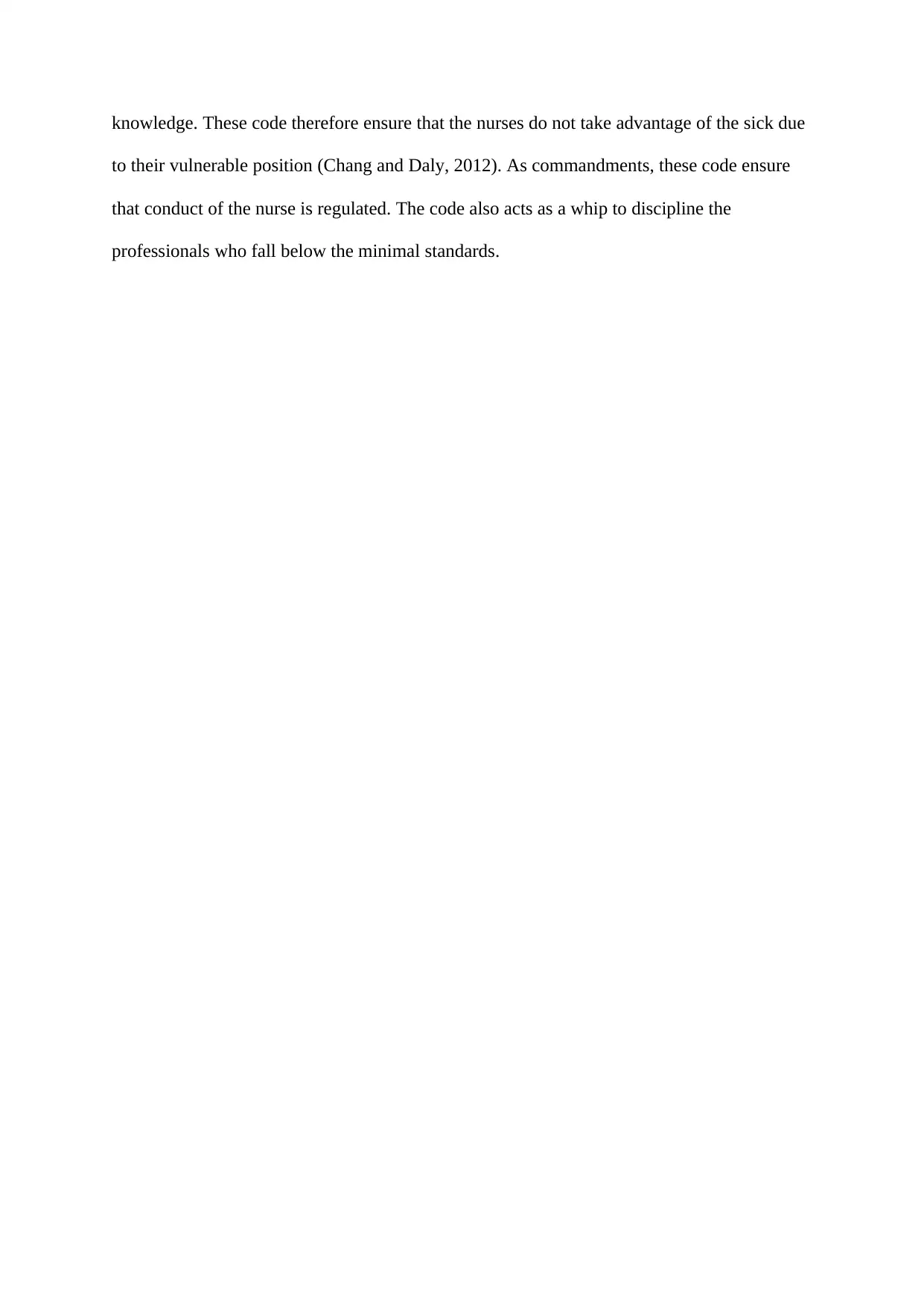
knowledge. These code therefore ensure that the nurses do not take advantage of the sick due
to their vulnerable position (Chang and Daly, 2012). As commandments, these code ensure
that conduct of the nurse is regulated. The code also acts as a whip to discipline the
professionals who fall below the minimal standards.
to their vulnerable position (Chang and Daly, 2012). As commandments, these code ensure
that conduct of the nurse is regulated. The code also acts as a whip to discipline the
professionals who fall below the minimal standards.
Paraphrase This Document
Need a fresh take? Get an instant paraphrase of this document with our AI Paraphraser
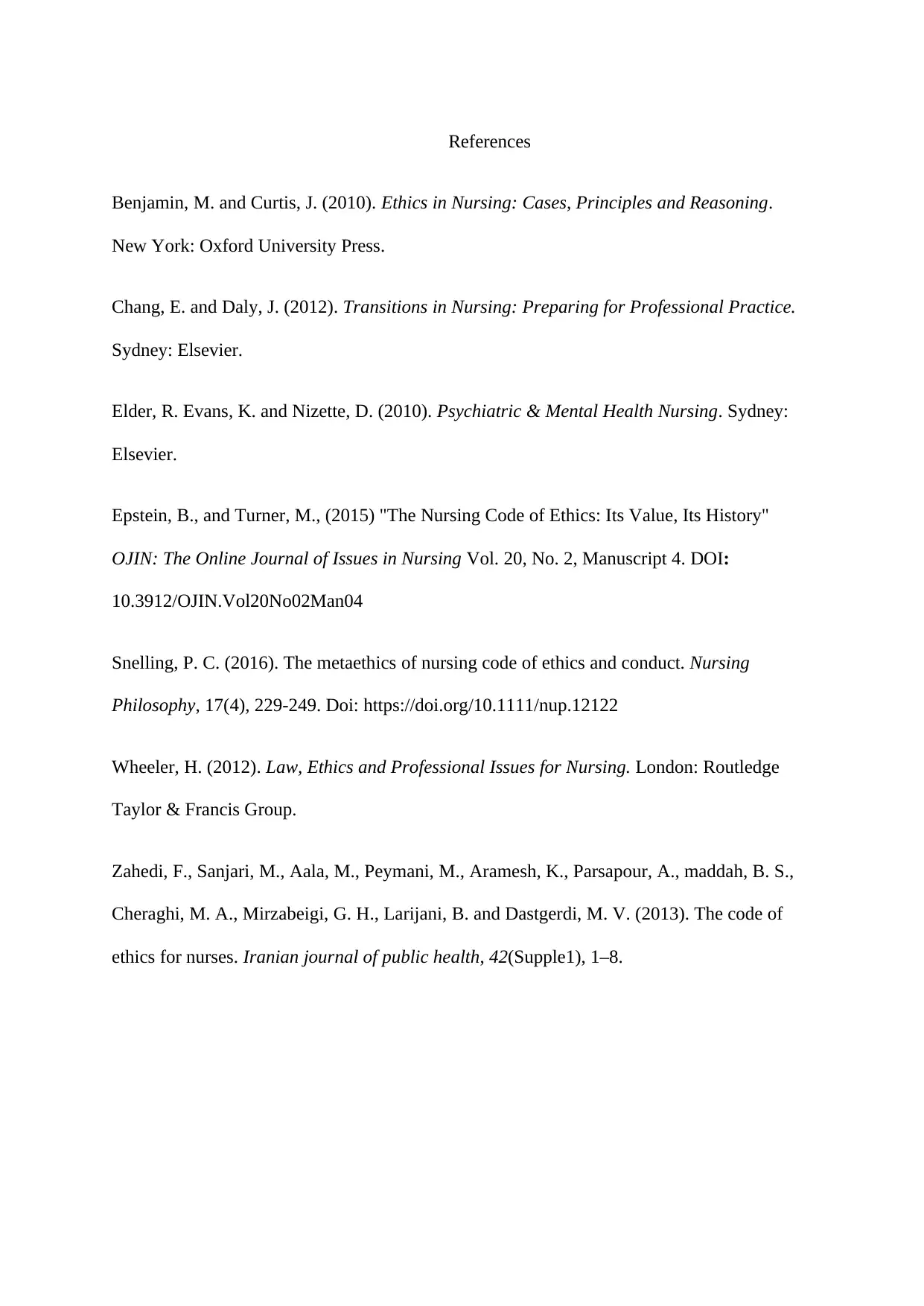
References
Benjamin, M. and Curtis, J. (2010). Ethics in Nursing: Cases, Principles and Reasoning.
New York: Oxford University Press.
Chang, E. and Daly, J. (2012). Transitions in Nursing: Preparing for Professional Practice.
Sydney: Elsevier.
Elder, R. Evans, K. and Nizette, D. (2010). Psychiatric & Mental Health Nursing. Sydney:
Elsevier.
Epstein, B., and Turner, M., (2015) "The Nursing Code of Ethics: Its Value, Its History"
OJIN: The Online Journal of Issues in Nursing Vol. 20, No. 2, Manuscript 4. DOI:
10.3912/OJIN.Vol20No02Man04
Snelling, P. C. (2016). The metaethics of nursing code of ethics and conduct. Nursing
Philosophy, 17(4), 229-249. Doi: https://doi.org/10.1111/nup.12122
Wheeler, H. (2012). Law, Ethics and Professional Issues for Nursing. London: Routledge
Taylor & Francis Group.
Zahedi, F., Sanjari, M., Aala, M., Peymani, M., Aramesh, K., Parsapour, A., maddah, B. S.,
Cheraghi, M. A., Mirzabeigi, G. H., Larijani, B. and Dastgerdi, M. V. (2013). The code of
ethics for nurses. Iranian journal of public health, 42(Supple1), 1–8.
Benjamin, M. and Curtis, J. (2010). Ethics in Nursing: Cases, Principles and Reasoning.
New York: Oxford University Press.
Chang, E. and Daly, J. (2012). Transitions in Nursing: Preparing for Professional Practice.
Sydney: Elsevier.
Elder, R. Evans, K. and Nizette, D. (2010). Psychiatric & Mental Health Nursing. Sydney:
Elsevier.
Epstein, B., and Turner, M., (2015) "The Nursing Code of Ethics: Its Value, Its History"
OJIN: The Online Journal of Issues in Nursing Vol. 20, No. 2, Manuscript 4. DOI:
10.3912/OJIN.Vol20No02Man04
Snelling, P. C. (2016). The metaethics of nursing code of ethics and conduct. Nursing
Philosophy, 17(4), 229-249. Doi: https://doi.org/10.1111/nup.12122
Wheeler, H. (2012). Law, Ethics and Professional Issues for Nursing. London: Routledge
Taylor & Francis Group.
Zahedi, F., Sanjari, M., Aala, M., Peymani, M., Aramesh, K., Parsapour, A., maddah, B. S.,
Cheraghi, M. A., Mirzabeigi, G. H., Larijani, B. and Dastgerdi, M. V. (2013). The code of
ethics for nurses. Iranian journal of public health, 42(Supple1), 1–8.
1 out of 5
Related Documents
Your All-in-One AI-Powered Toolkit for Academic Success.
+13062052269
info@desklib.com
Available 24*7 on WhatsApp / Email
![[object Object]](/_next/static/media/star-bottom.7253800d.svg)
Unlock your academic potential
Copyright © 2020–2026 A2Z Services. All Rights Reserved. Developed and managed by ZUCOL.





